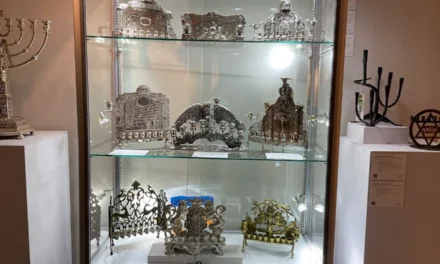By CARIN M. SMILK
(JNS)
April tends to feature a flurry of Holocaust-related arts pieces—from new exhibits to books to webinars and movies. One of them this year offers a through-the-generations feel that brings the past right into viewers’ homes.

David and Avi Wisnia at a panel discussion as part of the International Conference on Education About Auschwitz and the Holocaust, October 26-29, 2015. Photo courtesy of Avi Wisnia.
PBS recently aired “How Saba Kept Singing,” a documentary on the familial and musical relationship between the late Polish Holocaust survivor David Wisnia, a cantor, and his grandson, Avi Wisnia.
The film debuted at the Weitzman National Museum of American Jewish History in Philadelphia, where about 250 people attended a screening and question-and-answer session, followed by an end-of-Passover reception.
There, the younger Wisnia performed two songs: “How Long It’s Been,” which appears at the closing credits in the documentary; and “Oswiecim,” which was often performed, in Polish, by the elder Wisnea as part of the rehashing of his history as a young prisoner in Auschwitz and later, Dachau. He immigrated to the United States in 1946.
Starting in 2015, the two began touring areas of the United States—New York, New Jersey, Pennsylvania, Virginia, California—where the elder Wisnia would tell his story and belt out songs, and the younger would accompany him musically on piano and often vocally. They also visited Poland together, the last time in 2020.
“I’ve been accompanying him my whole life,” Avi Wisnia, 40, a singer/pianist/songwriter who lives in Philadelphia, told JNS. “But I never thought I’d be going on the road with my 90-year-old grandfather. I was his tour manager, driver, caretaker.”
As the elder Wisnia became more comfortable telling his story of survival, predicated on his vocal skills (a student at the Yavneh-Tarbut Hebrew-school system, he also trained musically as a child), it also became more of a challenge to travel, says his grandson, who had to assist him with growing physical challenges.
David Wisnia died on June 15, 2021, at the age of 94. It was his goal, he told audiences over and over again, to outlive his Nazi German captors.
“I’m so fortunate to have gotten this time with my grandfather, to know him as a person and share this special bond through music,” says Avi Wisnia. “We influenced each other. I’d like to think that I opened him up, and he inspired me to stand up for what is right and to make sure that important stories are told. And to be grateful for freedom, the ability to make music—and for life itself.”










